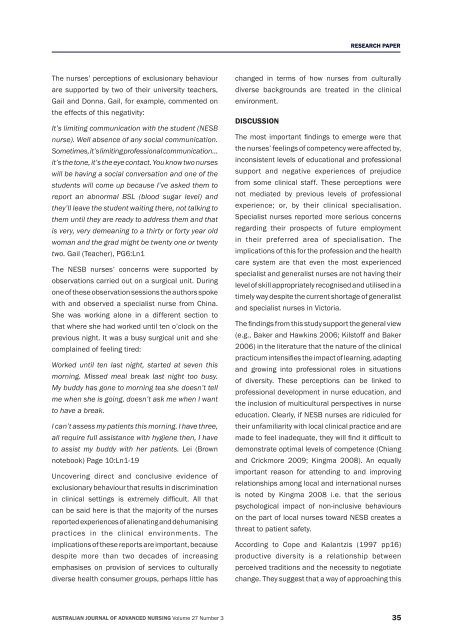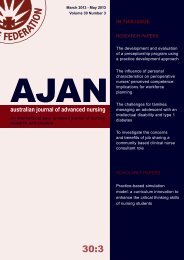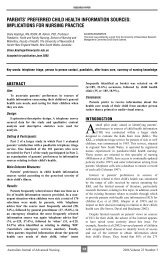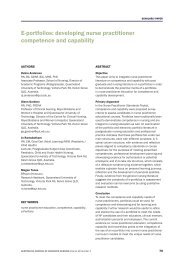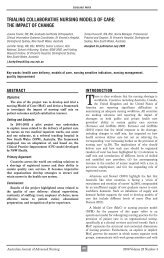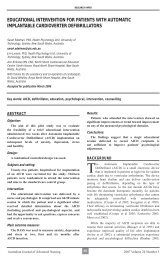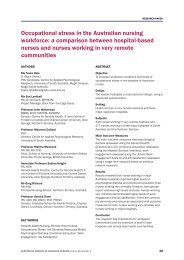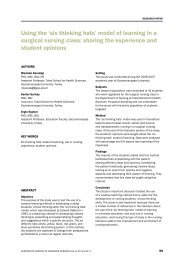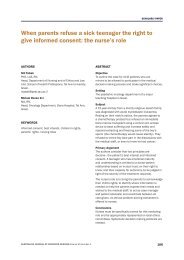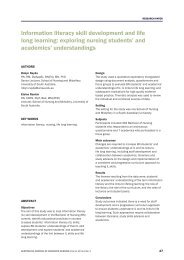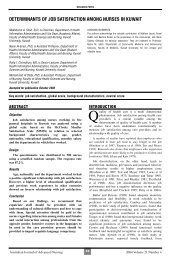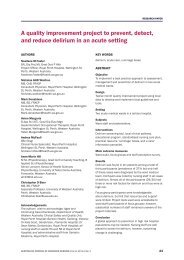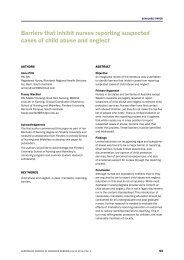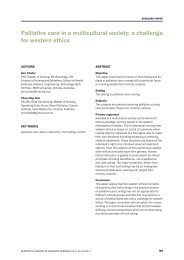March-May, 2010 - Australian Journal of Advanced Nursing
March-May, 2010 - Australian Journal of Advanced Nursing
March-May, 2010 - Australian Journal of Advanced Nursing
You also want an ePaper? Increase the reach of your titles
YUMPU automatically turns print PDFs into web optimized ePapers that Google loves.
RESEARCH PAPER<br />
The nurses’ perceptions <strong>of</strong> exclusionary behaviour<br />
are supported by two <strong>of</strong> their university teachers,<br />
Gail and Donna. Gail, for example, commented on<br />
the effects <strong>of</strong> this negativity:<br />
It’s limiting communication with the student (NESB<br />
nurse). Well absence <strong>of</strong> any social communication.<br />
Sometimes, it’s limiting pr<strong>of</strong>essional communication…<br />
it’s the tone, it’s the eye contact. You know two nurses<br />
will be having a social conversation and one <strong>of</strong> the<br />
students will come up because I’ve asked them to<br />
report an abnormal BSL (blood sugar level) and<br />
they’ll leave the student waiting there, not talking to<br />
them until they are ready to address them and that<br />
is very, very demeaning to a thirty or forty year old<br />
woman and the grad might be twenty one or twenty<br />
two. Gail (Teacher), PG6:Ln1<br />
The NESB nurses’ concerns were supported by<br />
observations carried out on a surgical unit. During<br />
one <strong>of</strong> these observation sessions the authors spoke<br />
with and observed a specialist nurse from China.<br />
She was working alone in a different section to<br />
that where she had worked until ten o’clock on the<br />
previous night. It was a busy surgical unit and she<br />
complained <strong>of</strong> feeling tired:<br />
Worked until ten last night, started at seven this<br />
morning. Missed meal break last night too busy.<br />
My buddy has gone to morning tea she doesn’t tell<br />
me when she is going, doesn’t ask me when I want<br />
to have a break.<br />
I can’t assess my patients this morning. I have three,<br />
all require full assistance with hygiene then, I have<br />
to assist my buddy with her patients. Lei (Brown<br />
notebook) Page 10:Ln1‐19<br />
Uncovering direct and conclusive evidence <strong>of</strong><br />
exclusionary behaviour that results in discrimination<br />
in clinical settings is extremely difficult. All that<br />
can be said here is that the majority <strong>of</strong> the nurses<br />
reported experiences <strong>of</strong> alienating and dehumanising<br />
practices in the clinical environments. The<br />
implications <strong>of</strong> these reports are important, because<br />
despite more than two decades <strong>of</strong> increasing<br />
emphasises on provision <strong>of</strong> services to culturally<br />
diverse health consumer groups, perhaps little has<br />
changed in terms <strong>of</strong> how nurses from culturally<br />
diverse backgrounds are treated in the clinical<br />
environment.<br />
DISCUSSION<br />
The most important findings to emerge were that<br />
the nurses’ feelings <strong>of</strong> competency were affected by,<br />
inconsistent levels <strong>of</strong> educational and pr<strong>of</strong>essional<br />
support and negative experiences <strong>of</strong> prejudice<br />
from some clinical staff. These perceptions were<br />
not mediated by previous levels <strong>of</strong> pr<strong>of</strong>essional<br />
experience; or, by their clinical specialisation.<br />
Specialist nurses reported more serious concerns<br />
regarding their prospects <strong>of</strong> future employment<br />
in their preferred area <strong>of</strong> specialisation. The<br />
implications <strong>of</strong> this for the pr<strong>of</strong>ession and the health<br />
care system are that even the most experienced<br />
specialist and generalist nurses are not having their<br />
level <strong>of</strong> skill appropriately recognised and utilised in a<br />
timely way despite the current shortage <strong>of</strong> generalist<br />
and specialist nurses in Victoria.<br />
The findings from this study support the general view<br />
(e.g., Baker and Hawkins 2006; Kilst<strong>of</strong>f and Baker<br />
2006) in the literature that the nature <strong>of</strong> the clinical<br />
practicum intensifies the impact <strong>of</strong> learning, adapting<br />
and growing into pr<strong>of</strong>essional roles in situations<br />
<strong>of</strong> diversity. These perceptions can be linked to<br />
pr<strong>of</strong>essional development in nurse education, and<br />
the inclusion <strong>of</strong> multicultural perspectives in nurse<br />
education. Clearly, if NESB nurses are ridiculed for<br />
their unfamiliarity with local clinical practice and are<br />
made to feel inadequate, they will find it difficult to<br />
demonstrate optimal levels <strong>of</strong> competence (Chiang<br />
and Crickmore 2009; Kingma 2008). An equally<br />
important reason for attending to and improving<br />
relationships among local and international nurses<br />
is noted by Kingma 2008 i.e. that the serious<br />
psychological impact <strong>of</strong> non‐inclusive behaviours<br />
on the part <strong>of</strong> local nurses toward NESB creates a<br />
threat to patient safety.<br />
According to Cope and Kalantzis (1997 pp16)<br />
productive diversity is a relationship between<br />
perceived traditions and the necessity to negotiate<br />
change. They suggest that a way <strong>of</strong> approaching this<br />
AUSTRALIAN JOURNAL OF ADVANCED NURSING Volume 27 Number 3 35


